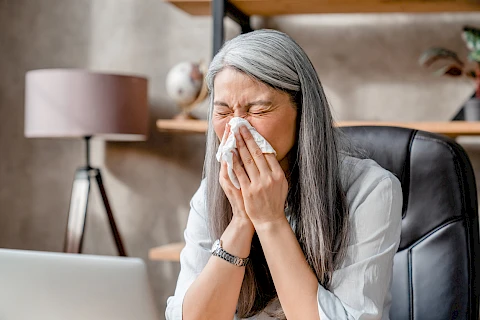
As we age, our immune systems undergo changes. Sometimes, these changes can lead to increased sensitivity to certain environmental or dietary factors. For seniors, one common manifestation of this is allergies. While allergies are often associated with the younger population, they can affect people of all ages.
Knowing the signs of allergies and how to manage them is key to staying active and healthy. By recognizing symptoms and learning effective strategies, you can keep allergies from slowing you down.
What Are Allergies?
Allergies result from the immune system's overreaction to a normally harmless substance, referred to as an allergen. For seniors, allergens can range from certain foods and medications to environmental factors like pollen or dust.
Food allergies are fairly common. For instance, some seniors may develop an allergy to shellfish, peanuts, or certain fruits. Seasonal allergies, also known as hay fever, are typically triggered by pollen from trees, grass, and weeds. Seniors can also react to medications. Always check with your healthcare provider if you develop any unusual symptoms after starting a new medication.
These allergies manifest in a variety of symptoms. Sneezing and a runny or stuffy nose are typical of an allergic reaction to airborne substances. An itchy or sore throat or itchy, watery eyes can also signify an allergic response. Hives, which are red, itchy welts, can indicate a more severe reaction, especially to medication or food allergens.
Prevention of Allergies
Preventing exposure to allergens is a key step in managing allergies. A few practical changes can make a big difference.
Start by keeping your windows closed, especially during times when pollen count is high. This will limit the amount of allergens that enter your living space. After spending time outdoors, especially in a garden or park, shower and change into fresh clothes to remove any allergens that might have clung to you.
Regular cleaning is also essential. Dust allergens can accumulate on surfaces in your home, so frequent dusting and vacuuming are advisable. When it comes to food allergies, a careful review of food labels can prevent accidental consumption of allergenic foods.
Treatment of Allergies
Despite your best preventive efforts, allergy symptoms may still occur. Fortunately, many over-the-counter medications can help manage these symptoms.
Antihistamines can help relieve sneezing, itching, and runny nose, while decongestants can relieve nasal stuffiness. Corticosteroids, available as nasal sprays, can help reduce inflammation in the nasal passages. However, these medications should be used under the supervision of a healthcare professional, particularly for seniors who may be taking other prescription medications.
You should seek immediate medical assistance if you experience severe symptoms such as difficulty breathing, a sudden drop in blood pressure, or severe skin reactions. These could be signs of anaphylaxis, a severe and potentially life-threatening allergic reaction.
Get Assistance With Allergy Management
Understanding allergies, their symptoms, and how to manage them is crucial for seniors. Simple changes to daily routines can help prevent allergen exposure, and a range of medications can help manage symptoms. Consult with your healthcare provider for personalized advice on managing allergies. Living in Lebanon, Lewistown, Danville, Selinsgrove, or Lewisburg and need help with senior care? Senior Helpers Sunbury can support you with personalized care plans that take allergies into account. Contact us to learn more about our senior care services.